May 2024 in “Pharmacia/Farmaciâ” Purple sweet potato leaf extracts can help treat hair loss and fungal infections.
September 2023 in “Animals” Genes linked to wool fineness in sheep have been identified.
January 2021 in “Lecture notes in mechanical engineering” High temperatures, acidic conditions, and too much coconut oil damage hair, while a pH of 5 to 7 keeps it healthy.
 January 1990 in “Springer eBooks”
January 1990 in “Springer eBooks” The document talks about three main surgical treatments for hair loss: punch hair transplantation, alopecia reduction, and flap hair transplantation.
 13 citations,
January 2013 in “Applied and Environmental Microbiology”
13 citations,
January 2013 in “Applied and Environmental Microbiology” A gene in Sebekia benihana, CYP-sb21, is needed for a specific reaction on the drug Cyclosporine A, which could be important for hair growth without affecting the immune system.
 June 2024 in “Bőrgyógyászati és Venerológiai Szemle”
June 2024 in “Bőrgyógyászati és Venerológiai Szemle” New treatments for hair loss, like JAK inhibitors, PRP, anti-androgens, and minoxidil, offer better options.

AI can predict hair loss patterns to improve care and treatment.
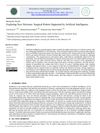
AI-assisted surgical robots improve surgery precision and safety.
 April 2021 in “Journal of Investigative Dermatology”
April 2021 in “Journal of Investigative Dermatology” An AI photographic device effectively tracked hair growth improvements in women treated for hair loss.
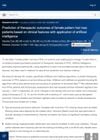 December 2020 in “Journal of The American Academy of Dermatology”
December 2020 in “Journal of The American Academy of Dermatology” Artificial intelligence can accurately predict hair growth and treatment results in female pattern hair loss patients, with age of onset and duration being key factors.
 9 citations,
January 2020 in “IEEE Access”
9 citations,
January 2020 in “IEEE Access” The KEBOT system is a highly accurate AI tool for analyzing hair transplants.
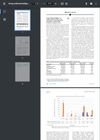 1 citations,
September 2022 in “JAAD international”
1 citations,
September 2022 in “JAAD international” Patients generally feel positive about alopecia areata treatments, but emotions vary by treatment type.
 June 2023 in “Journal of Cosmetic Dermatology”
June 2023 in “Journal of Cosmetic Dermatology” AI and AR are improving cosmetic dermatology but face challenges like data quality and ethical concerns.
 September 2020 in “British Journal of Dermatology”
September 2020 in “British Journal of Dermatology” The document highlights advancements and findings in dermatology, including AI use, disease prevention, treatment efficacy, and the impact of conditions on patients' lives.
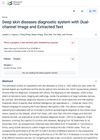 September 2022 in “Research Square (Research Square)”
September 2022 in “Research Square (Research Square)” The AI model DIET-AI effectively diagnoses skin diseases as well as doctors.
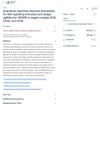 December 2022 in “Research Square (Research Square)”
December 2022 in “Research Square (Research Square)” The QuantAnts machines can find cancer markers and create CRISPR targets for them.
40 citations,
August 2005 in “JEADV. Journal of the European Academy of Dermatology and Venereology/Journal of the European Academy of Dermatology and Venereology” Acitretin moderately improved skin and eye issues but not hair loss or light sensitivity in a 3-year-old with IFAP syndrome.
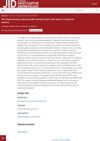 April 2023 in “Journal of Investigative Dermatology”
April 2023 in “Journal of Investigative Dermatology” The AI model somewhat predicts lymph node status in melanoma patients using skin sample images.
3 citations,
April 2017 in “Medicine” An 11-year-old boy in Saudi Arabia has a rare case of hypoparathyroidism with severe brain calcifications but normal development and no known cause.
2 citations,
March 2011 in “International Journal of Dermatology” An 18-year-old man was diagnosed with a rare genetic disorder causing hair loss, severe light sensitivity, and skin issues.
 August 2023 in “The journal of investigative dermatology/Journal of investigative dermatology”
August 2023 in “The journal of investigative dermatology/Journal of investigative dermatology” Childhood atopic dermatitis does not significantly affect general cognition.
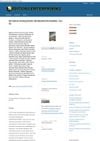 January 2023 in “Editora Enterprising eBooks”
January 2023 in “Editora Enterprising eBooks” The document concludes that the conceptionist theory is a way to acquire legal personality in Brazil.
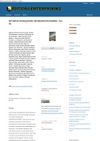 January 2023 in “Editora Enterprising eBooks”
January 2023 in “Editora Enterprising eBooks” The document discusses various research topics relevant to Brazil's social and scientific development.
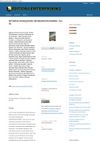 January 2023 in “Editora Enterprising eBooks”
January 2023 in “Editora Enterprising eBooks” Neuropsychopedagogy positively impacts education quality.
 August 2024 in “Dermatological Reviews”
August 2024 in “Dermatological Reviews” New technologies are improving the diagnosis and treatment of hair and nail disorders.
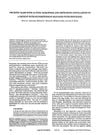 6 citations,
September 1988 in “Drug intelligence & clinical pharmacy”
6 citations,
September 1988 in “Drug intelligence & clinical pharmacy” Minoxidil caused a severe rash in a patient, which improved after stopping the drug.
 20 citations,
September 2020 in “International journal of computer applications”
20 citations,
September 2020 in “International journal of computer applications” The Random Forest algorithm was the most accurate at diagnosing Polycystic Ovarian Syndrome.
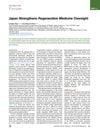 19 citations,
February 2018 in “Cell Stem Cell”
19 citations,
February 2018 in “Cell Stem Cell” Japan improved its regulation of regenerative medicine to ensure safety and prevent unproven treatments.
 29 citations,
November 2018 in “Journal of The European Academy of Dermatology and Venereology”
29 citations,
November 2018 in “Journal of The European Academy of Dermatology and Venereology” Personality traits and anxiety affect hair loss patients' quality of life.






















